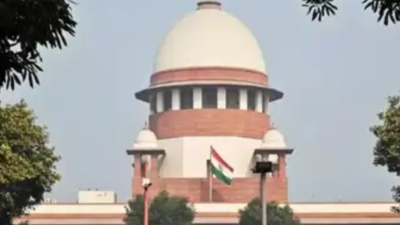BHOPAL: In a significant intervention, the Supreme Court has stayed an interim order of the
Madhya Pradesh High Court which had permitted the release and sale of equity shares worth Rs 350 crore linked to Som Distilleries Breweries & Wineries Ltd. The shares were earlier provisionally attached by the Income Tax Department’s Benami Prohibition Unit (BPU), Bhopal, under the
Prohibition of Benami Property Transactions Act (PBPT Act), 1988.
The Supreme Court's stay came in response to Special Leave Petitions (SLPs) filed by the BPU challenging the High Court's interim relief granted in Bana Singh v. Union of India & Others (WP No. 9187 of 2025).
At the core of the dispute are 1.2 crore publicly listed shares of SDBWL, held in the names of eight alleged benamidars—employees and associates of the Som Group. These shares, valued at over Rs 380 crore as of March 2025, were found to be
benami assets with the real ownership attributed to Jagdish Kumar Arora, promoter-director of Som Distilleries.
The provisional attachment was made under Section 24(4) of the PBPT Act by the Initiating Officer (IO), and later confirmed by the Adjudicating Authority (SAFEMA, Mumbai) under Section 26(3) in February 2025. Instead of appealing to the Appellate Tribunal under the Act, the alleged benamidars challenged the constitutional validity of the PBPT Act itself before the High Court.
The Madhya Pradesh High Court, in its order dated 27 March 2025, allowed the release and sale of the attached benami shares, directing that an equal number of shares held by Arora and the company be attached instead—an action the Union government termed ultra vires and legally untenable.
The SLP filed in the apex court described the High Court’s action as “beyond statutory powers,” emphasising that the PBPT Act does not allow substitution of attached benami property with other assets. According to the Act, the subject benami property must be specifically confiscated after due process—not swapped with other holdings.
The Centre argued that the High Court’s relief effectively allowed the disposal of the very assets under scrutiny, risking irreversible financial loss to the exchequer. The shares, if sold, could render the entire legal process moot.
The eight benamidars had previously attempted to pre-empt proceedings by filing writs even before the provisional attachment was issued—after mere show-cause notices under Section 24(1). These earlier petitions were dismissed by the High Court in March 2024, and subsequent SLPs were rejected by the Supreme Court in May 2024.
The IT Department refused to comment on the matter. Notably, the constitutional validity of the PBPT Act is already under review by the Supreme Court, following the recall of its own 2022 judgment in Union of India vs. Ganpati Dealcom. The Centre pointed out that by allowing interim relief in the form of property sale, the High Court had essentially prejudged a matter sub judice before the top court, undermining its authority.
With the next High Court hearing due on 9 May, the Supreme Court granted an urgent interim stay, preventing any further action under the High Court’s order. This, the Centre argued, was critical to prevent the benami shares from being sold off—a move that would not only violate the statute but could frustrate the entire benami prosecution mechanism.
The final decision on the SLP and the fate of the contested shares will be decided in further proceedings. For now, the apex court’s stay protects the attached assets and preserves the integrity of the ongoing proceedings under the PBPT Act.










